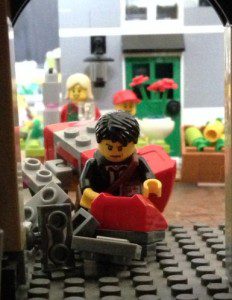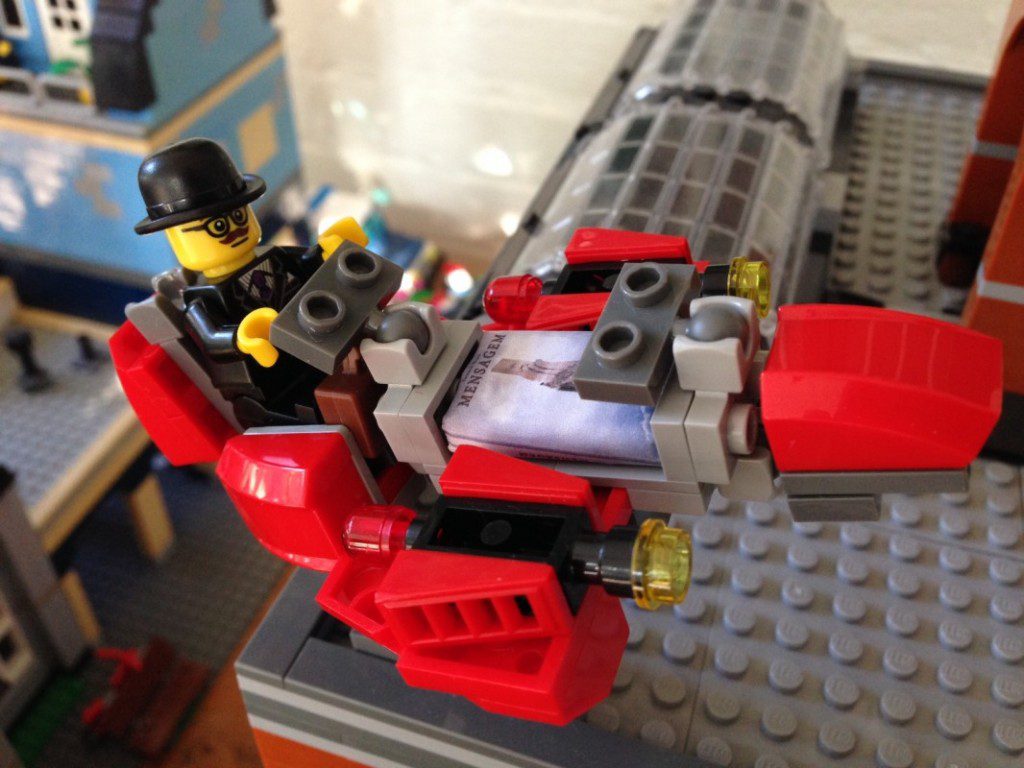Armchair Traveler
Because of my broken ankle, I missed this year’s New York Times Travel Show and that opportunity to plan my summer trip, which will — ankle permitting — take us to Poland and Lithuania where people in my family once lived. Along with retracing my roots, I also plan to visit the shipbuilding city of Gdansk to research the Solidarity movement, which plays a role in my protagonist JJ’s story in MOONWALKING. Like much of my family, JJ’s parents come from Poland; while his mother’s family came to the United States in the big immigration wave around the turn of the 20th century, his father was born in Poland and arrived in New York City with his parents at the age of 12, fleeing the Communist regime via a divided Berlin before the Wall.

Master Builder Patricio creates his Book Rocket.
For now, though, I’m grounded, and my travels take place via books. Some years ago, I created a Lego Book Rocket. The rider would load a book into the engine compartment, and the Book Rocket would fly to the destination of the book’s setting, under the principle that “books can take you anywhere.” In one of my Instagram stories, wily Patricio saved Little Brick Township by letting Lord Business use the Book Rocket after loading it with Dante’s Inferno. Wish we could do that in real life!
My latest book travel adventure took place via my VCFA friend Abigail Hing Wen’s debut YA novel Loveboat, Taipei. I was fortunate to have read an earlier version of this contemporary novel before she submitted it to agents, and I am thrilled and proud that it has turned into a major release and New York Times bestseller. The novel portrays Ever Wong, recently graduated from her suburban Ohio high school where she was one of a handful of Asian-Americans students. She’s looking forward to her last summer at home with friends before starting a six-year BS/MD program at Northwestern. She doesn’t really want to be a doctor — the sight of blood makes her faint — but she feels an obligation to immigrant parents, especially her father who gave up a chance to be a doctor when he immigrated to the U.S. Even so, she’s held on to her dreams of becoming a dancer, with secret application to NYU’s Tisch School of the Arts.
 Then her parents drop a bombshell (or perhaps an unwanted book in the Book Rocket). They’ve enrolled her in the Chien Tan summer program in Taipei, Taiwan to teach her appreciation for her Chinese culture. But little do they know, this 40-year-old program goes by another name: Love Boat. Eight weeks of drinking, partying, rulebreaking, nonstop hookups, and hearts broken and mended await Ever. In the process, the reader is dropped into a vivid, vibrant city of night markets, clubs, and a red-painted footbridge over the Keelung River that serves as the students not-so-secret escape route from their rain-soaked campus (because it rains a lot at that time of the year in Taiwan).
Then her parents drop a bombshell (or perhaps an unwanted book in the Book Rocket). They’ve enrolled her in the Chien Tan summer program in Taipei, Taiwan to teach her appreciation for her Chinese culture. But little do they know, this 40-year-old program goes by another name: Love Boat. Eight weeks of drinking, partying, rulebreaking, nonstop hookups, and hearts broken and mended await Ever. In the process, the reader is dropped into a vivid, vibrant city of night markets, clubs, and a red-painted footbridge over the Keelung River that serves as the students not-so-secret escape route from their rain-soaked campus (because it rains a lot at that time of the year in Taiwan).
Loveboat, Taipei is a treat for armchair travelers of all ages, and for a somewhat older person laid up with an injury, a chance to relive my own wilder days. We Jewish folks have our own version of Loveboat — the Birthright trip to Israel. Like Loveboat, it’s designed to connect Jewish teens and young adults to their heritage land, but there’s the unspoken goal as well — to build friendships and romantic relationships. The nonstop hookups in Loveboat (and Birthright) are not only tolerated but encouraged, within reason. Loveboat, Taipei captures this hidden purpose and accompanying tension with a humor that’s also profound. Ever finds out she’s on her way overseas when her parents catch her hugging a white boy. Later, she learns that certain Asian boys (and girls) are more acceptable than others when she meets Rick Woo, the overachieving student/musician/athlete to whom her parents have compared her, unfavorably, for years. She finds out that Rick’s family wants him to break up with his current girlfriend and meet another one on the program even though his girlfriend, Jenna, is also Asian American. I’ll probably never make it to Taiwan, and certainly not with Loveboat, but through Ever, Rick, Rick’s fashionable cousin Sophie, and wealthy bad-boy-with-a-secret Xavier, I took an unforgettable trip.
 I’ve now moved on to Olga Tokarczuk’s Flights, with its travel vignettes that span the world. I’m worrying about a father whose wife and three-year-old son have mysteriously disappeared on a small Croatian island.
I’ve now moved on to Olga Tokarczuk’s Flights, with its travel vignettes that span the world. I’m worrying about a father whose wife and three-year-old son have mysteriously disappeared on a small Croatian island.
I hope to interview Abigail Hing Wen in an upcoming post. Among other things I plan to ask her, I’d like to know how she feels about spilling the Loveboat secrets, given that her novel is a huge bestseller. Will parents be more wary about sending their “perfect” teens to a place of such temptations? Will the program beef up its staff to prevent incidents like those recounted in Loveboat, Taipei from occurring in real life? Or will parents — who may themselves be Loveboat graduates — figure, “we turned out all right and they will too”? No matter what, one should never underestimate the resourcefulness and recklessness of large groups of teens. Had my Book Rocket been real, they would have been on it.
Not convinced? Check out my review of Loveboat, Taipei for The Pirate Tree.

Lego Fernando Pessoa on the Book Rocket, powered by Mensagem.







Excellent review (as usual), Lyn. I have one issue, though, in how you describe the “Birthright” trip to Israel:
“We Jewish folks have our own version of Loveboat—the Birthright trip to Israel. Like Loveboat, it’s designed to connect Jewish teens and young adults to their heritage land, but there’s the unspoken goal as well—to build friendships and romantic relationships.”
“Birthright” is not a Jewish version of “Loveboat”—it’s a political Zionist organization whose full name is “Taglit Birthright” (“taglit” being the Hebrew word for “discovery”). The organization mirrors Israel’s political “right of return,” which presumes that the State of Israel belongs to all Jewish people, no matter where or when they were born. At the same time, the government of Israel denies this right to the Palestinian people who are indigenous to the land, displaced refugees whom the government of Israel created (more than 700,000 in 1948 alone), many more of whom the government of Israel has killed or imprisoned—and whom, as a people, the government of Israel does not recognize.
Thank you for reading and for the comment, Beverly! I wonder if the Loveboat program, which is 40 years old, has also struggled with larger political questions and how that may have changed over time and is changing today. At least one of the stories in It’s a Whole Spiel touched on the Palestinian issue, and there are a few references to Taiwan’s independence from China, as well as the status of the indigenous people of the island in Loveboat, Taipei.